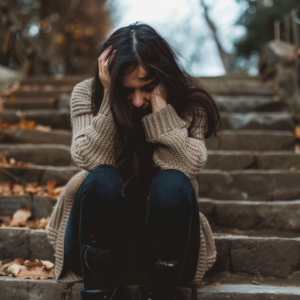
Hey there! Let’s chat about something significant: Signs of Depression is more than just feeling sad sometimes; it’s a severe condition that can affect anyone, and understanding its signs is the first step to getting help. In this post, we’ll explore what depression looks like, how to spot it, and what you can do if you or someone you know is struggling.
Understanding Depression
So, what is depression? It’s a mental health condition that makes you feel persistently sad or hopeless. You might lose interest in things you used to love, which can impact your daily life significantly. Over 264 million people around the world suffer from sadness, according to the World Health Organization. That’s a lot of stuff! But there is good news: noticing the signs can help you get help quickly, which is very important for feeling better.
Key Signs of Depression
Persistent Sadness
One of the most significant signs of depression is a lingering feeling of sadness that doesn’t go away. Imagine waking up every day with a heavy heart, even when nothing terrible has happened. Taking notes is a good idea if your mood is primarily low and affects your ability to enjoy life. Remember, feeling sad is okay, but it might be time to reach out for help if it’s constant and overwhelming.
Loss of Interest or Pleasure
Have you noticed that things you used to enjoy—like hobbies, social events, or even hanging out with friends—no longer excite you? This loss of interest is another crucial sign of depression. It can be frustrating and isolating. If you’re feeling indifferent about activities that once brought you joy, it might be worth reflecting on how long this has been going on.
Changes in Appetite or Weight
Depression can mess with your appetite. Some people eat less some people might eat to feel better and gain weight at the same time. If you’ve noticed significant changes in your eating habits or weight, consider whether this change coincides with feeling down. It’s a subtle but significant sign of what might be happening inside.
Sleep Disturbances
Let’s talk about getting enough sleep. It’s hard for you to fall asleep or stay asleep. For some reason, you might sleep too much. Having trouble sleeping can be a big sign of sadness. It’s possible that your sleep habits are telling you that something is wrong if you toss and turn at night or nap too much during the day.
Symptoms to Watch For
Fatigue and Low Energy
Are you feeling tired all the time? You’re not alone. Fatigue is a common symptom of depression. You might feel drained, even after a whole night’s sleep. This constant exhaustion can make everyday tasks feel overwhelming. If you find it hard to get out of bed or keep up with daily activities, that could be a sign that you need to pay attention to your mental health.
Difficulty Concentrating
Are you struggling to focus? Many people with Signs of Depression experience difficulty concentrating. You might feel like your mind is foggy, making it hard to complete tasks or follow conversations. If this sounds familiar, don’t brush it off. Difficulty concentrating is a natural symptom that can impact your work and relationships.
Feelings of Worthlessness or Guilt
Let’s talk about those nagging feelings of worthlessness or guilt. If you often think you’re not good enough or feel guilty for things that aren’t your fault, it’s time to take those thoughts seriously. These thoughts can be too much to handle and can make depression even more challenging to deal with.
Irritability or Restlessness
Depression doesn’t always look like sadness; it can also show up as irritability or restlessness. You might find yourself snapping at loved ones or feeling on edge. If you notice a short fuse or a constant sense of restlessness, it’s another sign that your mental health might need attention.
Physical Symptoms
Aches and Pains
Here’s something you might not expect: Signs of Depression can cause physical symptoms, too! Many people experience unexplained aches and pains, like headaches or back pain, that don’t seem to have a clear cause. If you’re dealing with physical discomfort along with emotional struggles, it’s essential to talk to a healthcare professional about it.
Changes in Libido
Depression can also affect your sex drive. You might notice a decrease in interest in sexual activity, which can add strain to relationships. If you find this happening, know that it’s a common symptom of depression. It’s essential to communicate with your partner and consider seeking help.
When to Seek Help
Now that we’ve talked about the symptoms and signs of sadness, let’s talk about when you should get help. These signs should be taken seriously by an MH nurse if you or someone you know needs help has had them for more than two weeks. Getting help early is very important for feeling better.
A therapist or counselor can help you and give you advice that is specific to your needs. You can get help in many ways, such as through therapy, medicine, or making changes to your lifestyle. One good way to change negative thought patterns and actions is through cognitive behavioral therapy (CBT).
Remember to change how you live! Some things that can help your mental health are working out regularly, eating well, and getting enough sleep. Having friends and family who are there for you can also make a big difference. You don’t need to handle this by yourself!
Conclusion
Signs of Depression to sum up, knowing the symptoms of sadness is an important first step toward getting help. If these things happen to you or someone you care about, remember it’s okay to ask for help. Depression can be treated, and getting better is possible. Let’s talk about how to take care of our mental health help each other along the way.
If you want to learn my #1 Organic Ashwagandha 2,100 mg – 100 Veggie Capsules Pure, Click Here Now.





